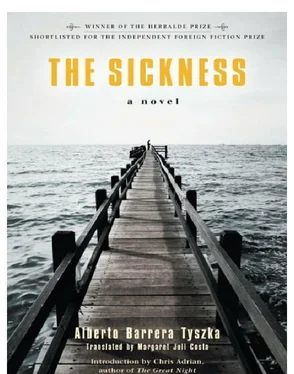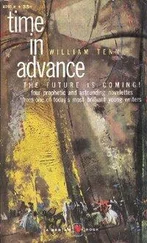“Hi, Dad. How do you fancy coming to Isla Margarita with me?”
In its heyday, the bar had been an old-fashioned Spanish tasca . Legs of Serrano ham hung from the walls and customers were always offered a little snack, a tapa , with their drink — some bread and a sliver of potato omelet, a few grilled sardines, some olives. Now, all that’s left of that Spanish heritage is its name: Las Cibeles. It’s just a bar where the people who work locally take refuge after six o’clock. Office workers, secretaries, administrators, and low-grade civil servants meet up to exchange the gossip of the day with the help of a few beers. The whole place is filled with a beery torpor, a chemical smell that even indicates the way to the toilets. At one end of the bar, Adelaida and Karina have had to wait until evening to finish their after-lunch conversation. Ernesto Durán’s latest letter remains the juiciest dish on the menu.
“I couldn’t say anything to Dr. Miranda because he rang in early and said he was canceling all his appointments. He said he wouldn’t be coming in this afternoon. As you know, he’s worried about his father, who’s in a really bad way apparently.”
Adelaida barely has time to nod. Karina seems so resolute, she’s speaking very rapidly and with great determination. She has thought of nothing else all afternoon.
“This has gone too far,” she says now, nervously smoothing her blouse. “If not today, then I’ll have to do it tomorrow, because this is something I really must tell the doctor about.”
“There’s no need to make such a drama out of it, Karina. It’s hardly the end of the world.”
“But what if the guy really is crazy?” asks Karina, genuinely concerned.
“He only followed him once, for one morning. He’s desperate. He needs to see his doctor.”
“Please, Adelaida, I’m being serious.”
“So am I.” She gives her friend a sly look, shifts closer to her and says softly: “We’ve all done crazy things in our time. Do you remember when I asked you to come with me to follow Cheo, and how we ended up in that awful place on Avenida Lecuna?”
“Yes, you wanted to find out if he really was playing dominoes with his friends!” says Karina. Adelaida nods sagely and flings her arms wide as if to underline the absurdity of the whole experience.
“Well, wasn’t that a crazy thing to do?”
“God, yes, it was real dive, full of whores and drunks,” says Karina. “You had a kind of hunch that he was two-timing you, cheating on you, but you needed proof.”
“If anyone had seen the two of us there, at that moment, at that hour of night, in that place, tailing my husband and trying to catch him out, what would they have thought of us, what would they have said?”
They look at each other for a second. Is this what’s happening to Ernesto Durán? Does he need proof and is he trying, however ineptly, to find that proof as best — or worst — as he can? He doesn’t care, he’s lost control. As we all do sometimes, as anyone can: it’s not so very hard to lose control; it happens when you least expect it. Just as Adelaida had had her suspicions and needed some evidence to back them up, so too, perhaps, Durán feels the same need to find out the truth, which is what he’s trying to do. He can’t go on living without knowing what’s really wrong with him. Sickness is a form of disloyalty, an unacceptable infidelity.
By the time she’s on her third beer, Adelaida has an idea.
“And what if you answered the letter?”
“ What ?”
“Why don’t you write to him as if you were Dr. Miranda?”
“You must be out of your mind, Adelaida! How could you even think of such a thing?”
“What’s wrong with the idea?”
“Everything. Dr. Miranda is Dr. Miranda and Karina Sánchez is Karina Sánchez. Besides, you can’t just play a trick like that, you—”
“Wait, wait. Listen.” Adelaida interrupts her and moves her stool closer. “Just think about it for a second. If you tell Dr. Miranda everything, if you show him this e-mail, what do you think will happen?”
Karina hesitates for a moment. She imagines Andrés, grave-faced, standing before her, holding the printed e-mail in his hands, reading it. But the scene dissolves at once, it goes no further.
“I don’t know. I haven’t a clue. He could react in all kinds of ways.”
“Exactly.” Adelaida draws still closer. “He might laugh it off and do nothing at all. Or he might phone the police. He could get this Durán guy into a lot of trouble.”
“But—”
“Wait, I haven’t finished. Look, I’m not suggesting you commit a crime, Karina. You know the doctor well, don’t you? How long have you been working for him now?”
“Seven years.”
“Longer than many marriages. Right then: you know his style, know more or less how he writes and what he might say to a patient like Durán.”
“But I’m not a doctor. I’ve never studied medicine.”
“That doesn’t matter. All that matters is that you write to him, that you reply.”
“You don’t know what you’re saying.”
“Of course I do. I think what that man needs is for someone to speak nicely to him, to listen to him, to give him a little attention.”
“And I think the beer is going to your head, Adelaida.”
“Just try it. Write to him once. Even if only to make him stop following the doctor, so that he has one less thing to worry about. That way, you’ll be helping them both.”
Karina again hesitates for a second, a second into which all her questions fit and into which slips the possibility that, yes, she really could do it. All temptations rely on such seconds. It’s all they need.
“What have you got to lose?”
The truth is she has nothing to gain either. But the temptation is still there, waiting for her. Why? Is it that she has a crush on Ernesto Durán? That first time, when she saw him come into the office, she had perhaps liked the look of him, but there had been no chemical charge, she hadn’t felt an immediate, unnameable attraction. Durán first began to touch her heart with his e-mails. She has got to know him more from having read those than from having seen or spoken to him. Through writing and reading she has begun to develop a kind of melancholic complicity that was now becoming a tension, a risk. The man behind the words interested her more than the man she’d seen or with whom she’d spoken on the phone. It was as if they were two different men, and she didn’t yet know which was more real, more authentic. Was that what tempted her?
“Alright,” said Karina, with a faint smile. “I’ll do it once. Just once.”
Dear Señor Durán,
I must, first of all, apologize that it has taken me so long to respond to your e-mails. The life of a doctor is an extremely busy one, as you know, and these last few weeks have been particularly hectic.
I have read carefully what you had to say and found it most interesting. For the moment, I think that you must try to remain calm and, above all, do nothing foolish. By which I mean, of course, following me. I have nothing against you, and I intend to keep a close eye on your case and, as soon as I can, will attend to you personally.
I will be away at a conference outside the city this week, but, the moment I return, I will be in touch with you again. Meanwhile, if it affords you some help and relief, feel free to continue writing to me.
Hoping that this letter restores to you a little much-needed calm, I remain,
Yours sincerely,
Andrés Miranda
When Andrés told Karina that he would be taking a few days’ vacation on Isla Margarita with his father, she saw in this the hand of God, and sensed behind or beneath this unusual turn of events the invisible fingers of a far superior force. Her boss’s sudden absence also proved to be her muse and gave her the push she needed to reply to Durán’s letter. It took her a while. She tried to put herself in the doctor’s place, she experimented with various tones and wrote several rough drafts before arriving at the definitive version. In the past, Dr. Miranda had asked her to write the occasional short message, usually in response to the sales departments of pharmaceutical companies. These had been concise letters of only a few lines, in which she had politely thanked the sales people for certain medical samples they’d sent, but never anything memorable or personal, and certainly nothing that presented her with a stylistic challenge that sent a shiver of excitement through her, the fascinating twinge of anxiety she felt when confronted by the blank computer screen: being able to choose had aroused in her an indescribable sensation, a kind of thrilling void in her mind. She felt she was as likely to sit paralyzed for a few seconds as to feel an urgent, unstoppable need to write a stream of words, extravagant and uncontrollable. Being able to choose, for example, which word to use for “Dear”— Estimado or Apreciado —was a revelation to her. Karina spent almost an hour turning over each word, savoring the sharpness of the consonants, the rotundity of certain vowels, weighing up the effect that each might have on Durán. It was no small matter: it was, after all, the first word that Dr. Miranda had addressed to him in a long time. In the end, she opted for Estimado , partly because it seemed to her more formal, more cautious, and partly, too, because she liked the e. However hard she tried, she could find no other reason, no other cause. She simply liked beginning the letter with an e . And that was that.
Читать дальше












